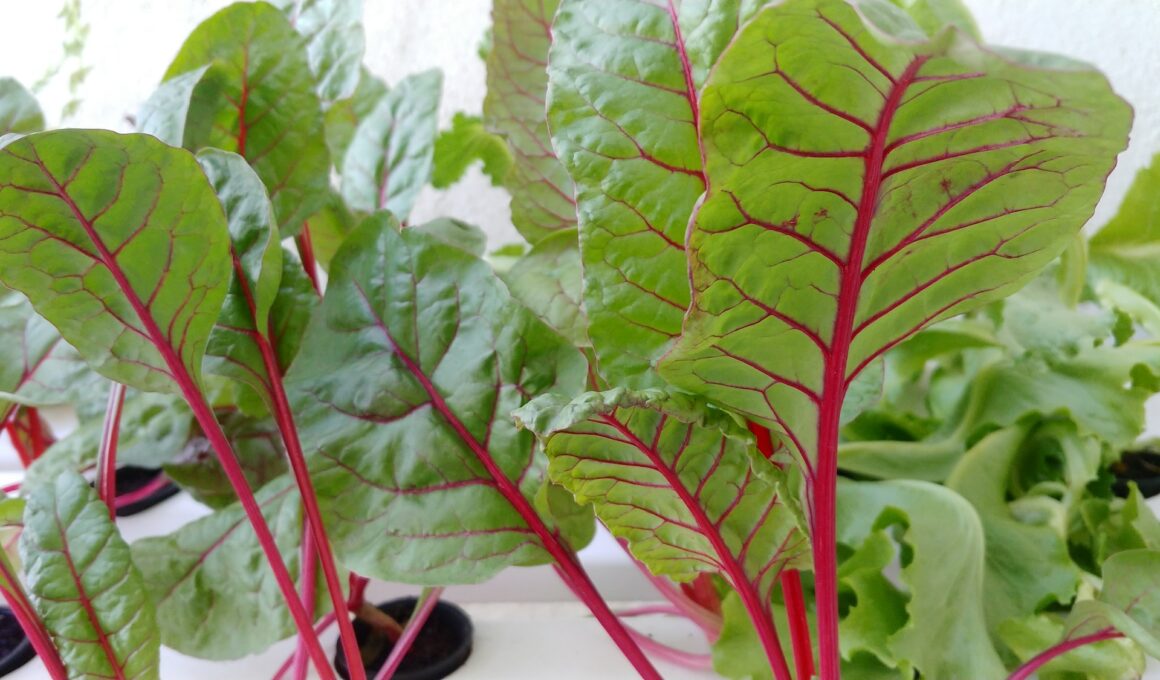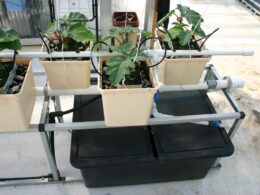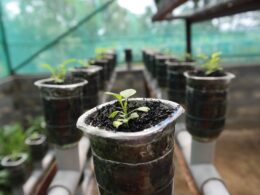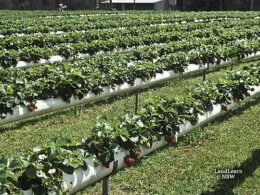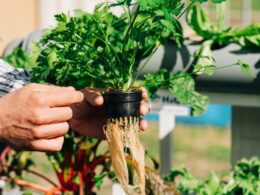Are you looking for a way to grow larger and healthier plants? Have you heard of hydroponic gardening? With hydroponics, you can grow plants without soil, using nutrient-rich water instead.
But does this method of gardening really lead to bigger and better plants? The answer is yes! Hydroponics can help you achieve impressive plant growth and yields. By providing plants with the exact nutrients they need and eliminating the challenges of soil-based gardening, hydroponics can help you produce healthier, larger plants in less time.
But before you jump into hydroponic gardening, it’s important to understand the basics and factors that affect plant growth. Keep reading to learn more about growing bigger and better plants with hydroponics.
Understanding the Basics of Hydroponic Gardening
Get ready to learn about the awesome world of hydroponic gardening and the basics you need to know to get started! Hydroponic systems are a soil-free way of growing plants using nutrient solutions. Essentially, the plants are grown in a water-based solution that contains all of the necessary nutrients for their growth. It’s a revolutionary way of gardening that’s gaining popularity due to its many benefits.
One of the benefits of hydroponic gardening is that it allows you to grow plants in any environment. You don’t need to have a lot of outdoor space or a particular soil type to grow plants. All you need is a hydroponic system and a nutrient solution. The system can be set up indoors or outdoors, and it can be small or large depending on your needs.
Another advantage of hydroponic gardening is that it allows you to control the nutrient intake of your plants. Since the plants are grown in a nutrient solution, you can adjust the levels of each nutrient to ensure that your plants are getting exactly what they need. This means that you can optimize the growth of your plants and get the best possible results.
Plus, since the plants aren’t exposed to soil-borne diseases and pests, you can reduce the need for pesticides and herbicides.
As you can see, hydroponic gardening is an exciting and innovative way to grow plants. With the right system and nutrient solution, you can grow plants in any environment and optimize their growth for the best possible results. So why not give it a try and see what you can grow?
Factors That Affect Plant Growth in Hydroponics
You’ll be surprised at the various factors that can impact the growth of your hydroponic plants, from the pH levels to the nutrients you choose. The most important factor is the nutrient solution you use. Plants need a variety of nutrients to grow, including nitrogen, phosphorus, and potassium. It’s vital to ensure that the nutrient solution is balanced and contains all the necessary nutrients for optimal growth.
Another important factor is lighting requirements. Since plants can’t grow without light, it’s essential to provide enough light for them to thrive. LED lights are the most common type used in hydroponic gardening because they’re energy-efficient and provide the right spectrum of light for plant growth. Make sure that the lights are positioned correctly and that they’re on for the right amount of time each day to ensure that your plants get the light they need.
In summary, to ensure that your hydroponic plants grow as large as possible, you need to pay close attention to the nutrient solution you use and the lighting requirements. By providing the right balance of nutrients and enough light, your plants will thrive and grow to their full potential. With a little bit of knowledge and attention to detail, you can create a thriving hydroponic garden that produces healthy, beautiful plants.
Comparing Hydroponic Plants to Soil-Grown Plants
If you’re curious about how hydroponic plants compare to those grown in soil, let’s take a closer look at their differences and similarities.
One of the main differences is nutrient absorption. In hydroponics, plants grow in a nutrient-rich solution, which allows them to absorb nutrients more efficiently than in soil. This means that plants grown hydroponically can grow faster and larger than those grown in soil.
Another difference is in water management. In hydroponics, water is constantly recirculated, which means that plants have access to a consistent supply of water. In soil, water can evaporate quickly or drain away, which can make it more difficult for plants to get the water they need. This can lead to stunted growth or even death in extreme cases.
Overall, while there are differences between hydroponic and soil-grown plants, both methods can produce healthy and productive plants. Whether you choose to grow your plants hydroponically or in soil, it’s important to pay attention to their nutrient and water needs to ensure they thrive.
So, go ahead and experiment with both methods to see which works best for you and your plants!
Does Using Hydroponics Result in Faster Plant Growth?
Hydroponics, a soilless farming method, has been shown to contribute to faster plants’ growth in hydroponics compared to traditional soil-based cultivation. By directly supplying plants with necessary nutrients and water, hydroponics optimizes the growth conditions, leading to faster and more efficient plant development. The controlled environment ensures that plants receive the required resources, promoting accelerated growth and higher yields. Additionally, hydroponics reduces the risk of pests and diseases, further enhancing plants’ growth in hydroponics.
Tips for Maximizing Plant Growth in Hydroponics
Want to maximize your plant growth in hydroponics? Check out these tips for achieving the healthiest and most productive plants possible!
First and foremost, proper nutrient management is crucial for the growth and development of your plants. Make sure to regularly check and adjust the nutrient solution to meet the specific needs of each plant. This will ensure that they’re receiving the right amount and balance of nutrients, leading to healthy and robust growth.
Secondly, maintaining the pH balance of your hydroponic system is also essential. The optimal pH range for most hydroponic plants is between 5.5 and 6.5. Regularly testing and adjusting the pH levels will prevent nutrient lockout and ensure that your plants are absorbing all the nutrients they need. It’s also important to note that different plant species may have different pH requirements, so make sure to research their specific needs.
Thirdly, providing adequate lighting is crucial for plant growth. LED grow lights are the most efficient and cost-effective option for hydroponic systems. Make sure to position the lights at the optimal distance from the plants to ensure they receive enough light without burning them. Additionally, providing proper ventilation and air circulation will prevent heat buildup and ensure that the plants receive enough carbon dioxide for photosynthesis.
By following these tips, you can maximize the growth and productivity of your hydroponic plants. Remember to regularly monitor and adjust the nutrient solution and pH levels, provide adequate lighting and air circulation, and research the specific needs of each plant species. With the right care and attention, you can grow healthy and thriving plants in your hydroponic system.
Conclusion: Is Hydroponic Gardening Right for You?
Deciding whether hydroponic gardening is the right fit for you ultimately comes down to your personal preferences and commitment. There are several advantages to hydroponics, such as faster growth rates and higher yields. However, there are also some disadvantages to consider, such as the initial cost of setting up a hydroponic system and the need for consistent monitoring and maintenance.
One thing to keep in mind when considering hydroponics is the cost comparison. While the initial investment may be higher, the long-term savings on water and nutrients can be significant. Additionally, hydroponic systems can be set up in smaller spaces, making them ideal for those with limited outdoor areas or living in urban environments.
At the end of the day, the decision to pursue hydroponic gardening comes down to your level of commitment and personal preferences. If you’re willing to put in the effort to maintain a nutrient-rich and well-maintained system, hydroponics can be a great option for maximizing plant growth. However, if you prefer traditional soil gardening or aren’t willing to invest the time and resources necessary for a successful hydroponic system, it may not be the right fit for you.
Frequently Asked Questions
How much does it cost to set up a hydroponic garden?
If you’re interested in setting up a hydroponic garden, there are a few things you should consider before diving in. First, you’ll need to decide whether you want to opt for a DIY hydroponic setup or hire a professional for installation.
The cost of hydroponic equipment can vary depending on the size and complexity of your setup, and you’ll also need to factor in ongoing maintenance costs. It’s important to do your research and budget accordingly to ensure you’re not caught off guard by unexpected expenses.
With a little bit of planning and preparation, however, a hydroponic garden can be a rewarding and cost-effective way to grow your own produce.
What are the environmental benefits of hydroponic gardening?
Looking to grow plants in a sustainable way? Hydroponic gardening might be the answer.
With hydroponics, you can conserve water and grow plants in urban areas where space is limited. This method of gardening uses nutrient-rich water instead of soil, which means that it requires less water overall.
Plus, you can grow more plants in a smaller area with hydroponics. So, if you’re looking to reduce your environmental impact and grow your own food, give hydroponics a try.
Can any type of plant be grown hydroponically?
If you’re wondering if any type of plant can be grown hydroponically, the answer is yes! However, not all plants are suitable for hydroponic techniques. Plants that have a shallow root system, like lettuce and herbs, are perfect for hydroponics.
You can also grow tomatoes, cucumbers, peppers, and even strawberries using hydroponic methods. Hydroponic gardening allows you to have complete control over the nutrients and environment your plants are exposed to. This means you can grow healthier plants that produce more yield compared to traditional soil gardening.
So, if you’re looking to expand your gardening skills, hydroponic gardening is a great option to try out!
What are the disadvantages of using hydroponics for plant growth?
Using hydroponics for plant growth definitely has its drawbacks. One major disadvantage is the impact on nutrition. Plants grown in hydroponics systems lack access to the nutrients they would normally get from soil, which can lead to deficiencies in certain vitamins and minerals.
Maintaining the proper nutrient balance in a hydroponics system can be tricky, requiring careful monitoring and adjustment. So while it may seem like a convenient and efficient way to grow plants, it’s important to weigh the pros and cons before deciding if hydroponics is right for you.
Is hydroponic gardening more time-consuming than traditional soil-based gardening methods?
When it comes to hydroponic gardening, time management is key. While it may be more time-consuming than traditional soil-based gardening methods, the efficiency and control that hydroponic gardening offers can make up for it.
With hydroponics, you have complete control over the growing environment, including the nutrients, pH levels, and lighting. This means that you can maximize your plant’s growth potential and yield.
Plus, with less time spent on weeding and soil maintenance, you can focus on other aspects of your garden. With proper time management and planning, hydroponic gardening can be a rewarding and efficient way to grow plants.
Conclusion
So, is hydroponic gardening right for you? It depends on your goals and resources.
Hydroponics can definitely produce larger and healthier plants than traditional soil gardening, but it requires more investment and maintenance.
If you have the space, time, and money to set up a hydroponic system, you can enjoy the benefits of faster growth, higher yields, and better quality of produce.
However, if you’re a beginner or have limited means, you may want to start with a small soil garden and gradually explore hydroponics as you gain experience and skills.
In any case, remember that hydroponics is not a magic solution to all gardening problems. It still requires careful planning, monitoring, and troubleshooting to ensure optimal plant growth and health.
You need to choose the right type of hydroponic system, nutrient solution, lighting, and ventilation for your plants, as well as maintain proper pH and temperature levels.
You also need to be prepared for potential challenges such as pests, diseases, and equipment failure.
With patience, determination, and knowledge, however, you can reap the rewards of hydroponic gardening and enjoy fresh and delicious fruits and vegetables all year round.





